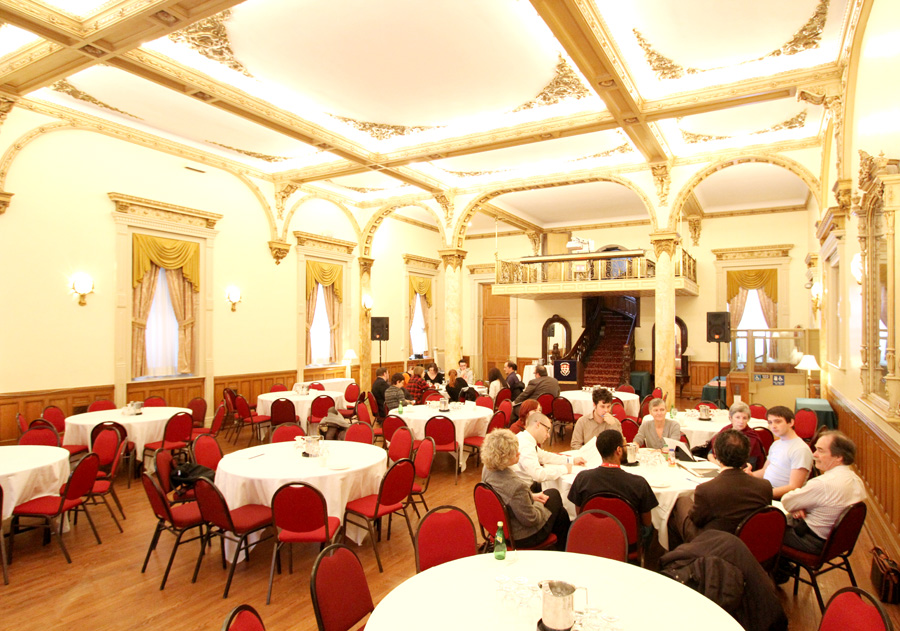On Feb. 20, the McGill administration hosted a Consultation Fair on the downtown campus concerning the recently released Statement of Values and Principles on Freedom of Expression and Freedom of Assembly and Operating Procedures. Participants at the Fair raised concerns with the language of the Statement of Values and the restrictions outlined in the Operating Procedures, as well as the relationship between the two documents.
The Statement of Values and the Operating Procedures will replace the provisional protocol that currently governs the university’s response to demonstrations and protests on campus. The provisional protocol has been in effect since Feb. 12, 2012, after a group of students occupied the sixth floor of the James Administration building for five days.
The Consultation Fair was the second of two fairs hosted to revise of the Statement of Values, before it is taken for approval to the McGill Senate on Mar. 20, and the Board of Governors on Apr. 26. The Operating Procedures, however, will not be ratified by either body. The first Consultation Fair was held at the Macdonald campus on Feb. 13.

Senior administrators engaged in moderated discussion with a small turnout of six students about possible improvements to be made to the content or language of the two documents.
“This protocol, for me, is the administration saying, ‘This is when we’re going to intervene, under these conditions,’ and [then] trying to describe those conditions,” Andre Costopoulos, dean of students said. “I think what we have to focus on is: are the statements in there clear enough?”
Several students did not appear to think so, and raised the issue of the document’s “ambiguous wording” throughout the discussion. Some pointed out that terms like “intimidation” and “intentionality,” found in the Statement of Values, may have great variance in meaning from person to person, and may affect whether an assembly would be classified as peaceful or not. Students suggested that vague terms such as these should therefore be changed or removed.
“[With a demonstration], one can intend to disrupt and not disrupt,” Morton Mendelson, deputy provost (student life and learning), said in response. “The issue of intentionality only comes into play when you intend to disrupt.”
Participants at Wednesday’s fair also discussed how much interference caused by a demonstration or assembly should be permitted before the event is deemed disruptive. Some students argued that the wording in the Statement of Values—specifically, the “right of members of the University community to carry out their normal activities without undue interference”—scarcely allows for the disruptive nature of demonstrations, and suggested substituting “interference” with “obstruction.”
Other students even questioned the need for two documents, and what makes them different.
Joey Shea, U3 arts, said she believes that the Operating Procedures should be more closely tied with the Statement of Values.
“For me, there [is] a lot of ambiguity as to what is the relationship between these two documents,” she said. “I totally agree with the Statement of Values for the most part, but … there’s a huge discrepancy—for me at least—between the values and how they’re going to be implemented [into the Operating Procedures].”
Students also suggested adding a ‘fair warning clause’ to the Operating Procedures in order to counteract the unclear language of the Statement of Values. McGill Security or the administration would use such a clause to issue clear warnings to protestors when their demonstration has been deemed in need of intervention. Sam Gregory, U1 arts, expressed concern about the lack of such a clause in the Operating Procedures.

“[Will] fair warning be given [to students] when protest will be broken up, or [when] actions [will] be taken?” Gregory asked. “[The Procedures] should also make clear to students what the consequences are for violating the rules.”
Students also expressed confusion over the roles and limits of McGill Security and the administration in maintaining peace on campus.
“Security Services, disciplinary officers … they all have very different but very defined roles, and they all have very different powers,” Costopoulos said in response to students’ questions.
“We need to better educate, not only students but staff and faculty as well, about who is responsible for what in terms of campus order,” he continued. “By making clearer the division of powers within university governance, we can create a context that is much clearer for students to express themselves without intimidation.”
The McGill community may continue to submit their feedback on both documents on the Statement of Value’s open website
until Mar. 8.









